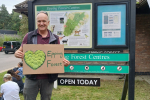Dr Neil Hudson MP spoke out in support of protecting agricultural land and the green belt which is currently at risk from overreaching solar developments.
The Environment, Food and Rural Affairs Select Committee Member reinforced his support for low carbon energy but stressed that the push for net zero must include a healthy food production industry and thus cannot compromise prime agricultural land. But unfortunately, increasingly large solar panel farms dominate rural landscapes that once hosted crops and livestock.
This comes amid ongoing stresses to international food supplies caused by the pandemic, the war in Ukraine and the unfolding climate crisis.
His statement was backed up by CPRE, the Countryside Charity, which submitted evidence to a parliamentary inquiry into land use highlighting "horror stories of solar farms liberally applying herbicides to the ground around/under their arrays." This can have an industrialising effect on the landscape and lead to the loss of productive farmland.
In the House of Commons, Dr Neil Hudson MP asked:
“Our EFRA Select Committee has just been finishing our Food Security Inquiry and one of the key areas we looked at was land use. And solar, I'm sure has a big part to play in our energy mix, but we must be careful of the unintended consequences about taking prime food producing land and the Green Belt out taking prime food producing land and the Green Belt out and replacing it. And it's similar to the trees debate. The right trees in the right places. It should be the right solar panels in the right places. Does she agree with me that there are the right places to put them? Not least the many roofs across the country, not least on agricultural buildings?
Dr Caroline Johnson MP, who secured the debate, replied:
“I couldn't agree with him more. In fact, in some respects, he has paraphrased my speech into a few sentences very eloquently. So, thank you.”
Speaking afterwards Dr Neil Hudson, MP added:
“Solar is an important part of the low carbon energy mix – as we rightly push for net zero.
“What I object to is a subsidy model that incentivises huge sprawling solar farms which dominate productive agricultural landscapes and puts the UK’s food security at risk. From industrial estates to agricultural buildings, we have large structures available for solar panels and must use a common-sense approach to prioritise them rather than taking out food producing land or the precious green belt.
“Our EFRA committee report on Food Security is due to be released imminently and with recent instability to the global food supply caused by the pandemic, the war in Ukraine, we cannot risk the potential repercussions of low agricultural productivity."




